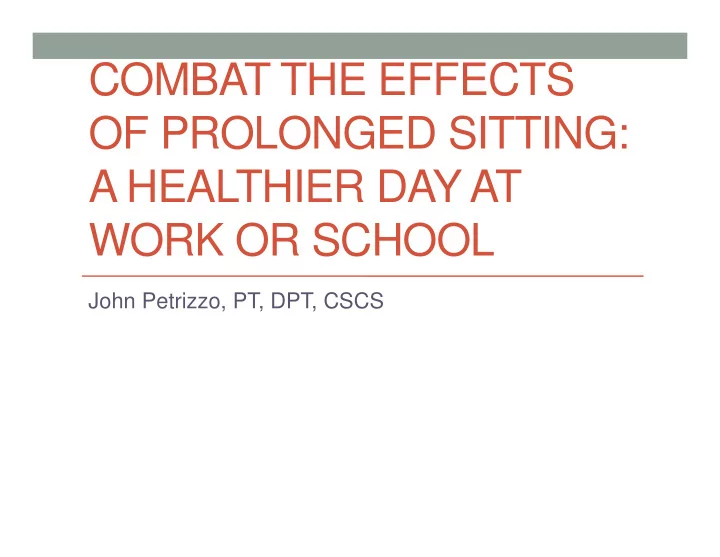

COMBAT THE EFFECTS OF PROLONGED SITTING: A HEALTHIER DAY AT WORK OR SCHOOL John Petrizzo, PT, DPT, CSCS
What is Posture?
What is Posture? • Describes both biomechanical alignment as well as orientation of the body to the environment • Serves as a reflection of neuromuscular status • Never Static!
How Important is Our Posture? • Lennon et al have hypothesized that posture affects and moderates every physiologic function from breathing to hormonal production
What is Ideal Posture? • Good posture can be defined as: • State of muscular and skeletal balance that protects the body against injury or progressive deformity • Poor posture can be defined as: • Faulty relationship of the body’s segments resulting in increased strain and less efficient balance of the body over its BOS
Sit Up Straight! • Faulty posture has been linked to: • Tension-type HA • TMJ disorders • Shoulder impingement syndrome • Respiratory dysfunction • Back pain • Impaired balance • Fibromyalgia • Osteoporotic spinal deformity
Posture and the Musculoskeletal System • The natural curves of the spine are considered to be either lordotic or kyphotic • cervical lordosis, thoracic kyphosis, lumbar lordosis • If any one of these curves is missing or exaggerated, the end result is poor posture
The Spinal Curvatures
Posture and the Musculoskeletal System: Crossed Posture Syndrome
Posture and Respiration • Body posture and the flexibility of the thoracic cage greatly affect the quality of breathing
Posture and Respiration • Austin and Ausubel found that a course of proprioceptive musculoskeletal education improved both respiratory muscular strength and endurance without any respiratory exercise • McMaster et al found a correlation between increasing severity of kyphosis and respiratory impairment in patients with congenital vertebral anomalies
Negative Effects of Sitting • “Today, our bodies are breaking down from obesity, high blood pressure, diabetes, cancer, depression and the cascade of health ills and everyday malaise that come from what scientists have named sitting disease ” • James Levine, MD, PhD • On Average, we sit 7.7 hours a day • Some estimate people sit up to 15 hours per day
The Negative Effects of Sitting • 2010 study published in the American Journal of Epidemiology followed 123,216 individuals from 1993- 2006 and found: • Women who were inactive and sat over 6 hours per day were 94% more likely to die than those who were physically active and sat less than 3 hours per day • Men who were inactive and sat over 6 hours per day were 48% more likely to die than their more active counterparts
Where Do We Go From Here?
How Do We Combat the Effects of Prolonged Sitting • Make sure your workstation is set up appropriately • Practice “setting” your posture throughout the day • Stand up or walk around as frequently as you can • Stretch what’s tight, strengthen what’s weak
Workstation Ergonomics
“Setting” Your Posture
Easy Ways to Stand/Move More • Walk more • Park your car farther away from your office, use stairs not elevators, take a longer route to the restroom or to class • At your desk • Set a timer to remind you to stand up and stretch or walk around every thirty minutes • On the phone • Stand up while taking phone calls
Easy Ways to Stand/Move More • Emails • Don’t send emails if the recipient is near; walk over and talk to them instead • Commuting • Avoid long sitting commutes by standing on the bus, subway, or train • Watching TV • Lose the remote; get up to change the channels • Stand and stretch during commercial breaks
Stretch What’s Tight, Strengthen What’s Weak • Try performing these simple exercises periodically throughout the day: • Chin Tuck • Crossover Shoulder Stretch • Seated Glute Stretch • Doorway Pec Stretch • Wall Slide • Standing Hamstring Stretch
Chin Tuck • Stretches posterior neck musculature while also strengthening the deep neck flexors • Perform 10 repetitions with a 5 second hold
Crossover Shoulder Stretch • Stretches the posterior shoulder musculature • Perform 2-3 rounds of 30 seconds
Seated Glute Stretch • Stretches the posterior hip musculature • Perform 2-3 rounds of 30 seconds
Doorway Pec Stretch • Stretches the anterior shoulder musculature • Perform 2-3 rounds of 30 seconds
Wall Slide • Stretches and strengthens the upper back musculature while also strengthening the abdominals • Perform 10 repetitions periodically throughout the day
Wall Slide
Standing Hamstring Stretch • Stretches the posterior thigh and calf musculature • Perform 2-3 rounds of 30 seconds
Standing Hamstring Stretch • DO NOT DO THIS!
REMEMBER! • If any of the previously recommended exercises or stretches causes you acute pain, DON’T DO THEM!
Conclusions • Poor posture coupled with prolonged sitting can have a negative impact on your overall health • Fortunately, there is plenty that you can do to help combat the negative effects of prolonged sitting to keep yourself happy and healthy while at work or school
Recommend
More recommend